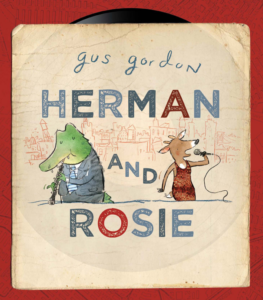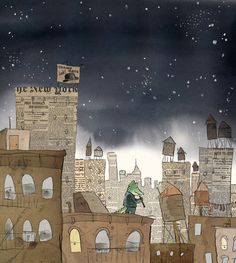 Herman and Rosie
Herman and Rosie
By Gus Gordan
Roaring Brook (an imprint of Macmillan)
$17.99
ISBN: 978-1596438569
Ages 3-7
On shelves now
New Yorkers are singularly single minded. It’s not enough that our city be rich, popular, and famous. We apparently are so neurotic that we need to see it EVERYWHERE. In movies, on television, and, of course, in books. Children’s books, however, get a bit of a pass in this regard. It doesn’t matter where you grow up, most kids get a bit of a thrill when they see their home city mentioned in a work of literature. Here in NYC, teachers go out of their way to find books about the city to read and study with their students. As a result of this, in my capacity as a children’s librarian I make a habit of keeping an eye peeled for any and all New York City related books for the kiddos. And as luck would have it, in the year 2013 I saw a plethora of Manhattan-based titles. Some were great. Some were jaw-droppingly awful. But one stood apart from the pack. Written by an Aussie, Herman and Rosie, author Gus Gordon has created the first picture book I’ve ever seen to successfully put its finger on the simultaneous beauty and soul-gutting loneliness of big city life. The fact that it just happens to be a fun story about an oboe-tooting croc and deer chanteuse is just icing on the cake.
Herman and Rosie are city creatures through and through. Herman is a croc with a penchant for hotdogs and yogurt and playing his oboe out the window of his 7th story home. In a nearby building, Rosie the deer likes pancakes and jazz records and singing in nightclubs, even if no one’s there to hear her. Neither one knows the other, so they continue their lonely little lives unaware of the potential soulmate nearby. One day Rosie catches a bit of Herman’s music and not long thereafter Herman manages to hear a snatch of a song sung by Rosie. They like what they hear but through a series of unfortunate events they never quite meet up. Then Herman gets fired from his job in sales and Rosie’s favorite jazz club goes belly up. Things look bad for our heroes, until a certain cheery day where it all turns around for them.
 You can know a city from afar but never quite replicate it in art. I do not know how many times Gus Gordon has visited NYC. I don’t know his background here or how often he’s visited over the course of his lifetime. All I know is he got Manhattan DOWN, man! Everything from the water towers and the rooftop landscapes to the very color of the subway lines is replicated in his pitch perfect illustrations. Maybe the medium has a lot to answer for. I love the map endpapers that identify not just where Herman and Rosie live, but also where you can find a great hot dog place. I like how the art is a mix of real postcards showcasing everything from Central Park (look at the Essex House!!) to the Rose Reading Room in the main branch of New York Public Library.
You can know a city from afar but never quite replicate it in art. I do not know how many times Gus Gordon has visited NYC. I don’t know his background here or how often he’s visited over the course of his lifetime. All I know is he got Manhattan DOWN, man! Everything from the water towers and the rooftop landscapes to the very color of the subway lines is replicated in his pitch perfect illustrations. Maybe the medium has a lot to answer for. I love the map endpapers that identify not just where Herman and Rosie live, but also where you can find a great hot dog place. I like how the art is a mix of real postcards showcasing everything from Central Park (look at the Essex House!!) to the Rose Reading Room in the main branch of New York Public Library.
But the art is far more than simply a clever encapsulation of a location. It took several readings before I could see a lot of what Gordon was up to. Here’s an example: Take a look at the two-page spread where Herman is leaving his office for the last time with all his goods in a box, while on the opposite page Rosie trudges home from the closing club, her high heeled red shoes sitting forlornly in the basket of her bike. The two images take place at different times of the day, but if you look closely you’ll see that they’re the same street corner. Yet where Herman’s New York is filled with loud angry voices and sounds, Rosie’s is near silent, a black wash representing the oncoming night. Note too that while Herman’s mailbox was a mixed media photo, Rosie’s is painted in a black wash with some crayon scribbles. It’s a subtle difference, but I love how it sort of represents how objects become less real when the lights begin to dim. And the book is just FILLED with tiny, clever details. From the pictures and instructions that grace Herman’s cubicle at work to the fact that Rosie clearly washes her clothes at home (the clothesline the runs from her bike to the old-fashioned vacuum tube television was my first clue) to Herman’s bed in the living room, Gordon is constantly peppering his book with elements that give little insights into who these two characters really are.
And that right there is the the crux of the book. Time and time again Gordon returns to this idea of how lonely it can be to live in a busy place. The idea that you can be surrounded by hundreds of thousands of people and feel as alone as if you were on a desert island is a tricky concept to convey to small fry. Herman’s whole personality, in a way, hinges on the fact that he’s terrible at his job as a telecaller because all he wants to do is talk to people on the phone, not sell them things. He longs for connection. Rosie, meanwhile, finds a certain level of connection through her singing gig. Once that gig leaves, her feelings of extreme loneliness echo Herman’s with the loss of his job. Their sole lifelines to the outside world have been severed against their wills. If this were a book for adults we’d undoubtedly also get a couple scenes of the various failed dates they fine themselves on (well, Rosie certainly… I’m not so sure that Herman’s the serial dater type). Kids understand loneliness. They get that. They’ll get this.
 The book also plays on the natural inclination for a happy resolution, and the near misses when Herman almost meets Rosie and Rosie just barely misses Herman can be excruciating. You are fairly certain the two are made for one another (the natural tendencies of crocs to eat deer notwithstanding) so it can be particularly painful to see so many almost wases. This feeling is, admittedly, partly diluted by the fact that you’re not quite sure what will happen when the two DO meet. Are they going to fall in love? Well, not exactly. There may be a kind of child reader that hopes for that ending, but instead we’re given a conclusion where the two just learn to make beautiful music together, and in the course of that music happen to find financial success as well. This is New York, after all. Love’s great but a steady paycheck’s even better.
The book also plays on the natural inclination for a happy resolution, and the near misses when Herman almost meets Rosie and Rosie just barely misses Herman can be excruciating. You are fairly certain the two are made for one another (the natural tendencies of crocs to eat deer notwithstanding) so it can be particularly painful to see so many almost wases. This feeling is, admittedly, partly diluted by the fact that you’re not quite sure what will happen when the two DO meet. Are they going to fall in love? Well, not exactly. There may be a kind of child reader that hopes for that ending, but instead we’re given a conclusion where the two just learn to make beautiful music together, and in the course of that music happen to find financial success as well. This is New York, after all. Love’s great but a steady paycheck’s even better.
The truth of the matter is that Herman and Rosie could be set in L.A. or Minneapolis or Atlanta or even Sydney and I’d still love it as much as I do with its New York flavor, tone, and beat. It wouldn’t be exactly the same, but it’s the bones of the book that are strong. The setting is just a bonus, really. With original mixed media, a text that’s subtle and succinct, and a story that rings both true and original (for a picture book medium anyway), this is a city book, a true city book, to its core. Author Markus Zusak said the book was “Quirky, soulful and alive”. Can’t put it any better than that. What he said.
On shelves now.
Source: Final copy sent from publisher for review.
Like This? Then Try:
- When Blue Met Egg by Lindsay Ward
- Bat and Rat by Patrick Jennings
- Have You Seen My Dragon? by Steve Light
Professional Reviews:
- Kirkus
- A star from Publishers Weekly
Misc: If you want to see some alternate covers for this book, scroll to the bottom of this fun blog post.



Thank you, Betsy. I have fallen in love with Herman and Rosie. These sweet characters, their quirky habits, the lovely way they discover each other… I could go on and on. This may be my favorite book of the year. Isn’t their band name just the best?!?
Sounds great! Thanks for the review. Looking for the book.
I agree. This book is beautiful. It feels good in your hands and it’s filled with Gus’s real-life love affair with New York and with music. In his spare time Gordon is a music guru and it’s so nice when someone’s favourite things collide with memorable characters and capture the spirit of the author in this way. The real textures and photographic elements fused with layered illustrations give it a truthiness that speaks to the soul. Can’t wait to see what he does next. Heard a rumour he might be going to spend some creative time in a much-loved European capital. Go Gus! (and Betsy.)
Go Gus! (and Betsy.)
Betsy,
I JUST finished reading this book. Loved it! Wondered about the NYC details–good to know they are correct, but even if they weren’t, I was prepared to argue in favor of this one for many of the reasons you point out, especially the fact that big cities can be just as lonely as my small town of Allegan. This ability to navigate between the excitement of the big city and the incredible loneliness possible among so many people is something I don’t remember seeing before. Kudos to Gordan! I plan to share this one with my first graders down the road.
Amazing review – totally inspired to order this book right now!
I’m always on the lookout for NYC children’s books as well. Can’t wait to read this one! Love the review.
[...] was tipped off to this title by super-librarian Betsy Bird’s Fuse No. 8 review on SLJ. As usual, her review covers all the bases illuminatingly, but I’ll add my personal likes. [...]